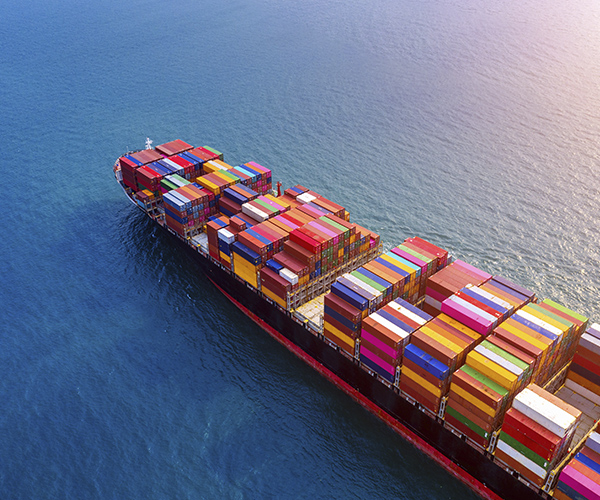Expert lawyers in International Transport & Customs law
Did you have a problem related to the transport of goods, whether by land, sea or air?
Every unforeseen event that occurs during the transport of goods (be it a delay, a loss or damaged goods), must be carefully analysed by the corresponding operator and duly advised, in order to claim against those liable and/ or their insurers for reparation of the damages caused.

1
Proximity
We are closer than you imagine: we have main offices in Madrid and Bordeaux and have offices in Paris and Barcelona at your disposal. It is now much easier to meet your interests and needs in person.
2
Experience
We have been providing customized solutions for more than 30 years in more than 15 areas of law that today are part of our most demanded services.
3
Professionalism
We develop our functions under strict values, among which ethics, commitment, and transparency stand out; always ready to handle your case successfully.
Legal advice: International Transport & Customs lawyers
Freight transport, whether by land, sea or air, is an essential activity in our modern society. The transported products must sometimes travel long distances and always reach their destination at the scheduled time. Any unexpected delay can cause deterioration to the product itself if it is perishable, for example or delays in the recipient’s production chain, which can lead to significant material and financial losses.
- We provide advice in 15 legal areas of practice.
- We are part of the Global Justice Network.
- We work with international lawyers in more than 35 countries.
- Accredited by the Consulate General of Spain in Bordeaux.
- Accredited by the Consulate General of France in Madrid
- We offer personalized attention in French, Spanish, and English.
- Our firm is made up of native lawyers from France and Spain.
- We have main offices in Madrid and Bordeaux and have offices in Paris and Barcelona at your disposal. We are close to you!
Contact us
At BCVLex, we are willing to evaluate your case for free to help you find a solution as quickly as possible.
Madrid Office:
C/ Velázquez 34, planta 6, oficina 601, 28001 Madrid
Tel: +34 91 577 6368
Barcelona Office:
C/ Roger de Llúria 84, Pral 08009 Barcelona
Tel: +34 93 100 53 17
Bordeaux Office:
2 Rue des Trois Conils 33000 Bordeaux
Tel: +33 (0) 5 57 01 36 36
Customer reviews
International Transport Lawyers
Freight transportation refers to the process of moving products, goods or cargo from one place to another. It is a critical component of the supply chain and plays a crucial role in the global economy. There are several modes of transporting goods, and choosing the appropriate mode depends on various factors, such as the nature of the load, the distance to be traveled, the speed required and environmental considerations.
Types of Freight Transport
Choosing the appropriate mode of transportation depends on factors such as urgency of delivery, price, distance, nature of cargo, and environmental considerations. Additionally, it is important to consider logistics aspects such as packaging, cargo tracking and supply chain management to ensure that goods reach their destination efficiently and safely.
- Road Transportation: Road transportation involves the use of trucks and cargo vehicles to move containerized or bulk goods. It is one of the most flexible and used modes, especially for short and medium distances.
- Rail Transport: The railway is an efficient option for transporting large quantities of goods over long distances. It is especially suitable for heavy and bulky loads.
- Maritime Transport: Maritime transport is used to move cargo internationally and over long distances. Cargo ships can transport a wide variety of products, including containers, bulk products and crude oil.
- Air Transport: Air transport is the fastest option for shipping goods, ideal for perishable or high-value products. However, it is usually more expensive than other modes and is limited in terms of carrying capacity.
- River Transportation: River transportation involves navigation on rivers and canals. It is common for transporting bulk goods, such as minerals and agricultural products.
- Transportation through Pipelines (oil and gas pipelines): They are used to transport liquids and gases over long distances efficiently. They are common in the energy industry, to transport oil, natural gas and other related products.
- Intermodal transportation: This approach combines multiple modes of transportation, such as road, rail, and sea, to optimize efficiency and reduce costs.
- Pipeline transportation: Mainly used to transport liquids or gases through pipes. It is common in the oil and gas industry, as well as for the supply of water and chemicals.
- Cable transportation: Although less common, cable cars or cable transportation systems are used in some places to move goods, especially in mountainous or road-inaccessible areas.
Claim incidents in freight transport
Claiming incidents in the transport of goods is a complicated process and even more so if it involves transport of goods internationally. When problems or unforeseen events arise during the transportation of goods, whether by road, rail, sea or any other means, it is essential that the parties involved take measures to resolve these situations in a timely and fair manner.
The process of claiming incidents in the transport of goods begins with the detection of a problem. This may include, for example, damage to cargo, delays in delivery, loss of merchandise, or any other event that affects the quality or compliance of the transportation service.
In this sense, claiming incidents in the transport of goods is an essential process to ensure that affected parties receive fair compensation and that the integrity of the supply chain is maintained. Effective communication and proper documentation are key to resolving these situations efficiently and satisfactorily for all parties involved.
Claim through Freight Transport Lawyers
In the transport of goods, there are various incidents that can give rise to claims. These incidents may vary depending on the mode of transport (road, rail, sea, air, etc.) and the specific circumstances of the operation, but here are some of the most common incidents that can be claimed:
- Damage to merchandise: If cargo is damaged during transportation due to improper handling, collisions, adverse weather conditions or other factors, a claim may be filed for repair or replacement of the damaged products.
- Loss of merchandise: If merchandise disappears or is lost in transit, a claim can be filed to request corresponding compensation or delivery of an equal quantity of products.
- Delays in delivery: When transport is not carried out within the agreed time and this causes problems or financial loss, claims may be made for additional costs incurred due to the delay.
- Incorrect delivery: If the merchandise is delivered to the wrong place or to the wrong person, a claim must be filed to correct the delivery and avoid additional losses.
- Failure to comply with the terms of the contract: If the carrier fails to comply with the terms and conditions of the contract of carriage, such as the agreed vehicle type, the specified route or the storage conditions, claims may be filed to enforce compliance or adequate compensation.
- Lack of documentation or incorrect documents: If cargo documents, such as invoices, waybills or certificates of origin, are not correct or are not provided properly, this can lead to problems at customs or delivery, and claims can be filed to resolve these issues.
- Theft or vandalism: If the merchandise is stolen or vandalized during transport, a claim must be filed to request the corresponding compensation.
- Incorrect loading or overloading: If cargo is incorrectly placed on the transport vehicle or overloaded, resulting in damage to merchandise or accidents, claims may be filed to recover costs associated with these errors.
- Temperature or humidity control issues: For temperature or humidity sensitive goods, such as perishable foods or pharmaceuticals, issues related to temperature or humidity control during transport can lead to claims.
- Failure to comply with environmental or safety regulations: If the transport of goods fails to comply with environmental or safety regulations, this may result in sanctions and fines, and claims may be filed to resolve these legal issues.
Complaint process in freight transportation
The claim process in the transport of goods through a specialized lawyer can be more formal and legally solid than a direct claim between the parties involved.
It is important to note that the exact process of claiming freight through a lawyer may vary depending on local laws, transportation regulations, and the specific details of the incident. A freight lawyer will have experience in this field and will be able to advise the client on the best way to address their claim effectively and legally.
Steps to claim incidents in freight transportation
- Detailed documentation: It is essential to collect all relevant information about the incident. This includes photographs of the damage, tracking records, invoices, transportation contracts, and any other related documentation.
- Communication with the carrier: The next stage involves contacting the transportation company or carrier responsible for the cargo. Communication must be clear and detailed, explaining the nature of the incident and providing all the documentation collected.
- Complaint registration: Most transport companies have established procedures for managing complaints. A claim form must be completed or required information provided per company policies.
- Claim evaluation: Once the claim is submitted, the shipping company will evaluate it. This may involve an inspection of damaged cargo or review of documents to determine liability and the amount of compensation.
- Negotiation and resolution: In many cases, a negotiation begins between the parties involved to resolve the claim. This may involve agreements on damage repair, refunds or the delivery of missing goods.
- Monitoring and documenting the resolution: It is important to keep a detailed record of all conversations and agreements reached during the claim process. This provides full traceability and can be useful in case of disputes later.
- Enforcement of agreements: Once an agreement is reached, both parties must comply with the agreed terms. This may involve repairing damage, refunding costs or delivering missing goods.
BCVLex: Lawyers in Freight Transportation
At BCVLex, we understand that freight transportation is an essential part of the global economy. We know that every shipment is valuable, and the integrity of your shipment is paramount. That is why we are proud to present ourselves as your legal partner specialized in the transportation of goods.
Our freight transportation law firm is dedicated to providing high-quality legal advice and representation to companies, carriers, shippers and other key players in the freight transportation industry. With a deep understanding of the legal and regulatory complexities surrounding this area, we are committed to safeguarding your interests and ensuring a smooth flow of goods at all times.
Why choose BCVLex as lawyers in the transportation of goods?
Our services in the transportation of goods include advice on transportation contracts, dispute negotiations, litigation, regulatory matters, customs issues and more. Whether you are dealing with damaged cargo issues, lost merchandise, or supply chain issues, BCVLex is here to provide you with strong legal solutions.
- Solid experience and knowledge: Our freight attorneys have extensive experience in transportation-related legal issues. We are up to date with the latest regulations and industry trends.
- Customer Commitment: We put our customers at the center of everything we do. We understand that each situation is unique, and we work closely with you to develop legal solutions tailored to your specific needs.
- Efficient dispute resolution: We are prepared to address a wide range of disputes, from cargo damage to delivery delays, using alternative dispute resolution or litigation approaches when necessary.
- Collaboration Network: BCVLex works collaboratively with experts in the transportation industry, including logistics and insurance experts, to ensure you have access to the best resources available.
- Commitment to excellence: We seek excellence in each case and are committed to defending your rights and interests at all times.
At BCVLex, our goal is to facilitate the efficient and safe movement of your merchandise while protecting your legal interests. Trust us to be your reliable ally in the freight industry. Contact us today for a consultation and find out how we can help you navigate the legal challenges in this dynamic field.



